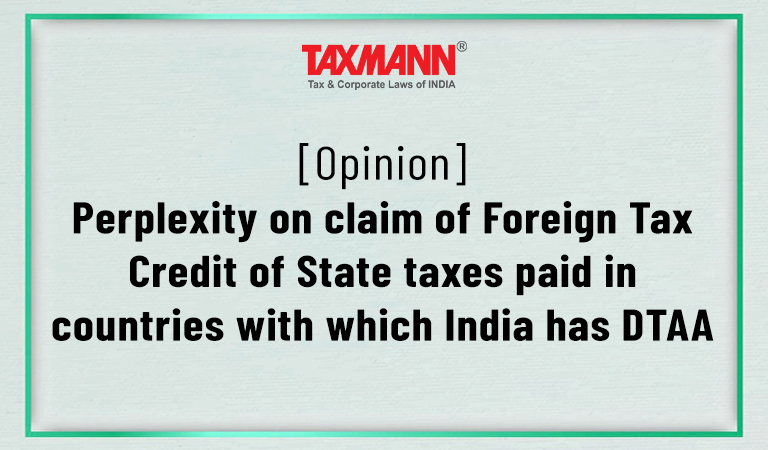[Opinion] Perplexity on claim of Foreign Tax Credit of State taxes paid in countries with which India has DTAA
- News|Blog|Income Tax|
- 2 Min Read
- By Taxmann
- |
- Last Updated on 8 December, 2022

Deepak Goel – [2022] 145 taxmann.com 295 (Article)
Foreword
Other than income tax paid to the Federal/Central government, income-tax paid in any country may also include the income tax charged by any part of that country including a State or a local authority e.g. in Japan and USA. Credit of said State & local taxes paid in a foreign country is a bone of contention between Indian tax department and taxpayers.
Whether foreign tax credit (‘FTC’) of aforesaid State & other local taxes paid in a foreign country with which India has entered into a Double tax avoidance agreement (‘DTAA’) is available under section (‘u/s’) 91 of the Indian Income-tax Act, 1961 (‘the Act’)? This convoluted issue is debatable for a while now. Of late this issue has been decided in favour of taxpayers by different Tribunals and High Court. This article succinctly discusses this issue through the relevant provisions of the Act and judicial pronouncements.
State & local taxes (in the nature of income tax/corporate tax) paid in a foreign country, if not allowed as credit, becomes a cost for the business despite making payment thereof. In some cases, this cost could be very substantial. If credit is not allowed then it results in double tax payment to that extent, once in foreign country and then in India again due to not granting credit thereof.
Let’s understand the impact with the help of an example. State taxes paid by ABC Pvt. Ltd. (an Indian entity) in a foreign county is INR 1 crore. Tax payable by ABC Pvt. Ltd. in India is INR 5 crores after all adjustments but before reducing FTC of State taxes. If credit of State taxes is not allowed then instead of INR 4 crores (INR 5 crores less: INR 1 crore) ABC Pvt. Ltd. will have to bear tax burden of INR 5 cores. This results in additional tax burden of INR 1 crore on account of not granting FTC of State taxes.
Claim of State taxes in view of sections 90 & 91 of the Act
Section 90 – Agreement with foreign countries or specified territories
“(1) The Central Government may enter into an agreement with the Government of any country outside India or specified territory outside India, —
(a) for the granting of relief in respect of —
(i) income on which have been paid both income-tax under this Act and income-tax in that country or specified territory, as the case may be, or
(ii) income-tax chargeable under this Act and under the corresponding law in force in that country or specified territory, as the case may be, to promote mutual economic relations, trade and investment, or
(b) ……….
(2) Where the Central Government has entered into an agreement with the Government of any country outside India or specified territory outside India, as the case may be, under sub-section (1) for granting relief of tax, or as the case may be, avoidance of double taxation, then, in relation to the assessee to whom such agreement applies, the provisions of this Act shall apply to the extent they are more beneficial to that assessee.
(2A) ………………”
Click Here To Read The Full Article
Disclaimer: The content/information published on the website is only for general information of the user and shall not be construed as legal advice. While the Taxmann has exercised reasonable efforts to ensure the veracity of information/content published, Taxmann shall be under no liability in any manner whatsoever for incorrect information, if any.

Taxmann Publications has a dedicated in-house Research & Editorial Team. This team consists of a team of Chartered Accountants, Company Secretaries, and Lawyers. This team works under the guidance and supervision of editor-in-chief Mr Rakesh Bhargava.
The Research and Editorial Team is responsible for developing reliable and accurate content for the readers. The team follows the six-sigma approach to achieve the benchmark of zero error in its publications and research platforms. The team ensures that the following publication guidelines are thoroughly followed while developing the content:
- The statutory material is obtained only from the authorized and reliable sources
- All the latest developments in the judicial and legislative fields are covered
- Prepare the analytical write-ups on current, controversial, and important issues to help the readers to understand the concept and its implications
- Every content published by Taxmann is complete, accurate and lucid
- All evidence-based statements are supported with proper reference to Section, Circular No., Notification No. or citations
- The golden rules of grammar, style and consistency are thoroughly followed
- Font and size that’s easy to read and remain consistent across all imprint and digital publications are applied



 CA | CS | CMA
CA | CS | CMA
